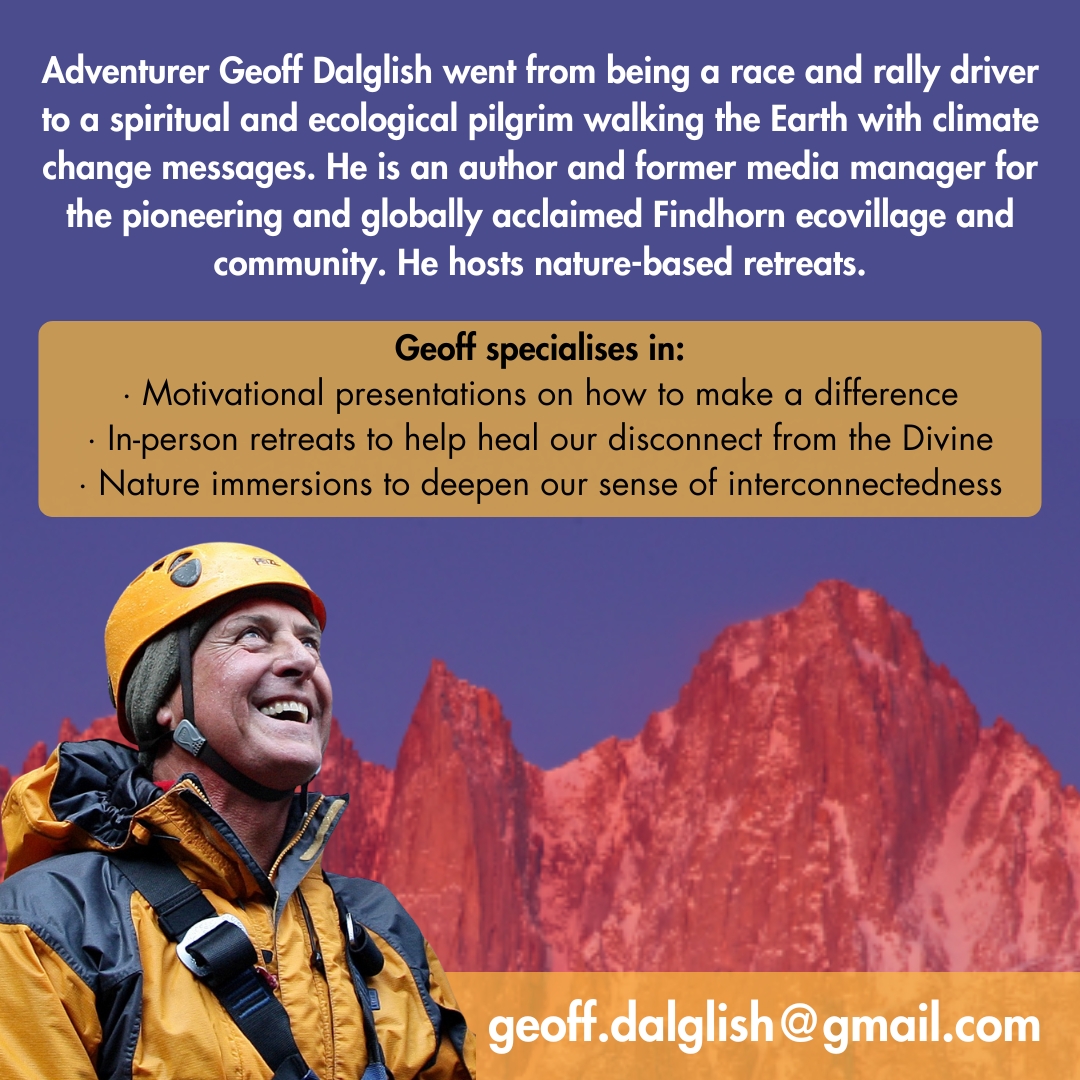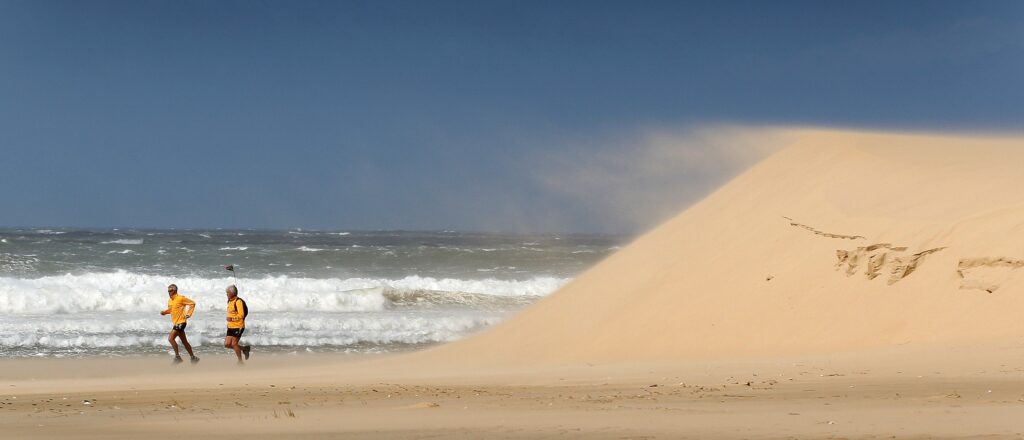“As a pilgrim I discover the mystery, the magic, the meaning and the magnificence of life in every step I take, in every sound I hear and in every sight I see.”
Satish Kumar, spiritual and ecological activist
Do you remember the impassioned plea of Swedish teen Greta Thunberg on Earth Day a few years ago, as she urged world leaders to “act as if the house is on fire, because it is.”
“She’s a nasty little brat,” one of my jaundiced journalist friends declared, joining the chorus that unfairly insisted she was being manipulated by forces with their own agendas.
I think not. I identified with her pain, anger and sense of betrayal, also understanding that it came from a great love of the Earth and all the life it supports. There is no greater motivator than love.
From my earliest childhood I felt similar emotions to Greta’s as I navigated a seemingly uncaring adult world of greed and disconnection. My feelings of Eco grief and hopelessness were sometimes overwhelming.
Greta famously told the World Economic Forum: “Adults keep saying we owe it to the young people to give them hope. But I don’t want your hope. I don’t want you to be hopeful. I want you to panic. I want you to feel the fear I feel every day. And then I want you to act.”
Fast forward to the second half of 2024 and there’s a wealth of research that explains what many feel, mercifully also pointing to a path of healing and restoration in the loving embrace of Mother Nature.
The reality is that humanity is in crisis. Equally true is that many bravehearts are tackling the issues head on. Many are superheroes of my daughters’ generation. People like my ecotherapist pal Jess Tyrrell, who facilitates profound connections with the rest of nature. As well as serving her individual and group clients with dedication, she guides outdoor adventurers on the legendary Rim of Africa hiking trail and manages a camp in Antarctica each summer. She rocks!
Another fearlessly embracing the big work of our time is our mutual friend Dr Matthew Zylstra, an Australian-born natural scientist and programme director for the Kwendalo Institute, who has made his family home on the Garden Route for over 15 years.
He, like so many researchers, observes that depression, anxiety, loneliness, feelings of isolation and disconnection, socio-economic issues, forgetfulness, loss of concentrationand even obesity are playing out on an unprecedented scale. It’s an epidemic.
Matt reports that research indicates that half of 18 to 24-year-olds are considered distressed or struggling. Alarmingly, the South African Depression and Anxiety Groups (SADAG) report logging around 3 000 helpline calls a day, dramatically up from 600 in 2019 and 1400 in 2021.
A staggering 1-billion people are estimated to have mental health issues. Matt says that 50 years of research shows that urban areas are becoming epicentres for chronic non-communicable physical and mental health disease, with modern medicine struggling to address these issues. These have been exacerbated by Covid-19, wars and climatic events.
“Research is showing what we’ve known for a long time, that nature has a profound effect on our wellbeing,” Matt says. “The critical issues of our time include the human (mental) health crisis and the planetary health crisis, with both having one thing in common: The relationship between people and the rest of nature.”
It’s a convergence of crises as we confront biodiversity loss and the sixth mass extinction, major climate disruption and severe weather events and, on the back of that, a growing desensitisation and disconnection from our collective life support system. We experience it as a separation sickness.
But all is not doom and gloom.
Nature – and remember that we’re an interdependent and interconnected part of that – is offering lifelines. And the key, Matt tells me, is not just the time spent in nature, but the quality of the moments. “It’s not just contact with nature. It’s the nature of the contact,” he insists poetically. “And that’s about how we notice, engage and ensure nature is an integral part of our everyday awareness.”
Healthcare professionals, like doctors and social workers, are beginning to tread a new path, the World Health Organisation noting in a 2017 study that: “Green space can deliver positive health, social and environmental outcomes… very few, if any, other health interventions can achieve all of this.”
Therapeutic Nature has a long and rich history and this can take the form of ecotherapy, horticultural therapy, wilderness therapy, nature-based therapy, forest therapy, animal-assisted therapy, adventure therapy and more.
A new language is evolving, with Matt and colleagues referring to Nature Referrals or NRx, while others often speak of green prescriptions, blue prescriptions, or nature on prescription. In response to the compelling scientific evidence, healthcare professionals in several countries are now going so far as to write out a formal script for their patients or clients.
Matt notes that, whilst there may be a willingness to engage with this, healthcare professionals are not always sure how to do it and who to recommend in their community. “So that’s why the Kwendalo Institute is advocating for an ‘outdoor health ecosystem’ on the Garden Route that connects ‘prescribers’ with ‘providers’ of nature-based activities.”
Complementary nature-based activities that healthcare professionals can formally recommend to a patient or client include park visits, walking clubs, farmers’ markets, bird watching, beach coast and river walks, canoeing and the Japanese tradition of Shinrin Yoku or ‘forest bathing’. Often there is the added benefit of social connectedness through group interactions to further enhance physical health and mental wellbeing. There are also online nature prescription programmes and self-guided trails available with partners such as NatureFix and Nature’s Valley Trust.
A hugely successful global phenomenon is the Park Run, a free, community event where you walk, jog, or run 5km, or volunteer or spectate. It takes place every Saturday morning in a multitude of major centres around the planet and is a fun way of bringing people together outdoors. It’s positive, welcoming and inclusive. There is no time limit, and no one finishes last. Everyone is welcome to come along, many partnering on the adventure with their dogs.
Matt suggests that a deeper connection is more just than a walk in the park. “Think of it like going to a gym. It’s not just exposure to the equipment but about the engagement and the effort we put in.” He adds that reciprocity, repetition and reverence (deep appreciation) are also key to forming a durable relationship with nature.
Nature connectedness, according to Matt’s earlier PhD research, is a consistent state of awareness that unites symbiotic thoughts, feelings and experiences into traits (enduring motivations) that promote everyday actions that nurture and respect our interrelatedness with the rest of nature.
The payoff is that individuals with high nature connectedness have more pro-nature behaviours and tend to be healthier and happier, living with a greater sense of meaning and purpose.
It’s also important that we don’t fall into the human trap of imagining we have dominion over the natural world around us, a 2023 document from the European Environmental Agency cautioning: “Our relationship with nature needs redefining from one of extraction to one of care. Human-nature connectedness should be strengthened in our social norms and value systems and in how we live our everyday lives.”
For years I’ve been guiding individuals and groups and engaging with an attitude of gratitude and a profound sense of reverence for all life, including the sacred earth beneath our feet. I like to imagine each step as a prayer and a blessing, given and received.
My walking mentor, Satish Kumar, the spiritual and ecological activist, says: “Either we can act as tourists and look at the Earth as a source of goods and services for our personal use, or we can become Earth Pilgrims and treat the planet with reverence and gratitude. Tourists value the Earth and all her natural riches only in terms of their usefulness to themselves, while pilgrims perceive the planet as sacred and recognise the intrinsic value of all life.”
I’m encountering this attitude more and more and, happily, also within the tourism and hospitality industry, one especially cherished discovery recently being Bushveld Bivouac just a few minutes from my home in the Raptors View Wildlife Estate in Hoedspruit.
Rarely have I been pampered in such luxury and yet felt so at one with my environment, enjoying beauty, connectedness and loving attention to detail.
Finding a special place where one can develop meaningful relationships is important and hardwired in our DNA, whether that place is overlooking the bird bath in the garden, or somewhere like Bushveld Bivouac, for those that can afford the privilege.
What’s not to love in only having a layer of canvas between you and the wilds or relaxing in the privacy of an outside plunge pool on a wooden deck overlooking magnificent bushveld.
Visionary owner and creator, Christine Pulvermacher, invites guests to the off-the-grid self-catering bush camp to dare, dream, discover. Or simply chill. “The ethos behind Bushveld Bivouac was to share a little piece of unspoilt nature with other people who would appreciate its value. Guests can revel in the supreme luxury of being away from it all, surrounded by bush sounds, a wide range of plains game and incredible birds. All sites are designed to fit in and flow with the natural features around them and offer eco-chic accommodation with plunge pools, self-catering and catered options and options that include an outside bath in an iconic setting or a wood-fired hot tub.
“We try always to maintain an environmentally friendly and holistic outlook. Above all, our aim is to ensure that a stay at Bushveld Bivouac is an exceptional treat for the soul: Relaxing, recharging and inspiring.” A world blessed with souls like Satish, Greta, Jess, Matt and Christine fills me with joy and confidence that we are on track.
Email: institute@kwendalo.co.za for more information
https://kwendalo.com/kwendalo-institute/ https://www.naturefix.life/ https://bushveldbivouac.com/




